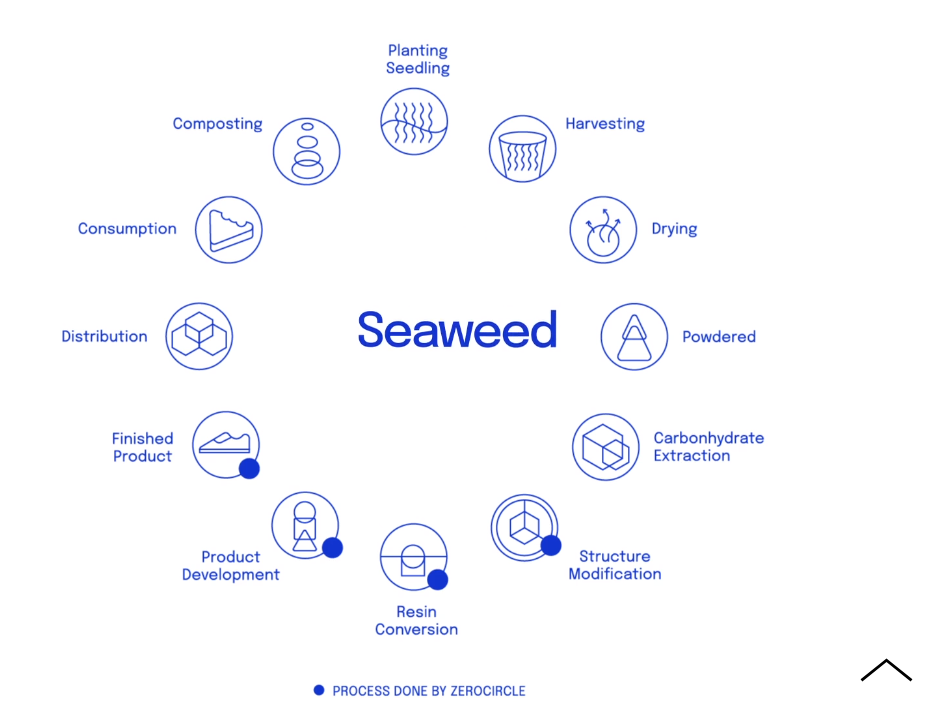
In 2014, Notpla made headlines worldwide with its seaweed packaging; packaging that is biodegradable, home-compostable, and disappears naturally. Some of it is even edible!
In 2023, Notpla was joined on the list of winners of the Tom Ford Plastic Innovation Prize for their biodegradable packaging solution by Maharashtra-based startup, ZeroCircle – another organization built on the back of seaweed. Placing second, it was the only company from India and Asia to win the award. The winners of the competition have been awarded a collective $1.2 million cash prize. All three winners of the prize use seaweed as their raw material.
The seed for ZeroCircle was planted when founder Neha Jain, a former employee of Google, was initially provoked by a documentary on seaweed and its various use cases that could help reduce waste. This stirred curiosity was accompanied by the recent awareness of an American woman’s change in lifestyle to become completely “zero-waste”. After developing an interest in climate change and associated sustainable measures, Neha attempted to find a replacement for land-based, food-source raw materials (such as potato starch) in the bio-based material category but first switched to a minimal carbon footprint lifestyle herself.
“I began to comprehend the impossible economics of recycling, zero-waste was a circular pipe dream in an economy that was linear”, said Neha.
As Neha explored seaweed as a substitute, she launched ZeroCircle in 2020.
ZeroCircle has invented and developed an alternative to fossil fuel-based thin-film polybags using seaweed. As opposed to other bioplastics that are marketed as compostable when, in reality, they are only industrially compostable in a factory environment with high heat, energy and humidity, ZeroCircle’s product is truly home compostable.
The hands-on team of ZeroCircle envisions a carbon neutral future. They believe seaweed’s regenerative capabilities when redesigned and reengineered can make the chemical, food, fashion and plastic industry sustainable and pollution free. They also believe that seaweed can revolutionize the food industry as a rich source of vitamin B-12.
Other plausible use cases of seaweed include:
1. Reduction of methane emissions - when added to cow feed at less than two percent of the dry matter, seaweed completely knocks out methane production. This is because seaweed contains chemicals that reduce the microbes in the cows' stomachs that cause them to burp when they eat grass.
ZeroCircle claims that just 9% of the ocean surface needs to be afforested to remove 53 billion tons of carbon dioxide from the atmosphere each year which is 13 billion tons more than the annual global emission rate. This means that, in ten years, the hopeless acidification of oceans and the poisoning of the atmosphere can be reversed.
ZeroCircle has already rolled out their packaging solution which is food-safe, thermally stable and serves shelf life needs. The flexible film is plastic-free, non-GMO, zero-PLA, transparent, heat sealable and printable. It is also landfill safe, marine safe and herbivore friendly.
ZeroCircle is also known for using existing infrastructure in terms of production lines and commercial production methods. Their business supports those fishing households who have been struggling with declining income due to unsustainable fishing practices, pollution and the warming seas and provides them with a secondary income source in the form of seaweed cultivation. Additionally, seaweed cultivation is a low-investment and near-shore activity and is commonly picked up by women.
Furthermore, increased seaweed cultivation sequesters CO2 much more than land-based plants, cools the ocean and contributes to the production of 90% of the oxygen in the atmosphere.
A pioneer in its field in the Indian market, ZeroCircle has boldly announced its arrival and demands change.






